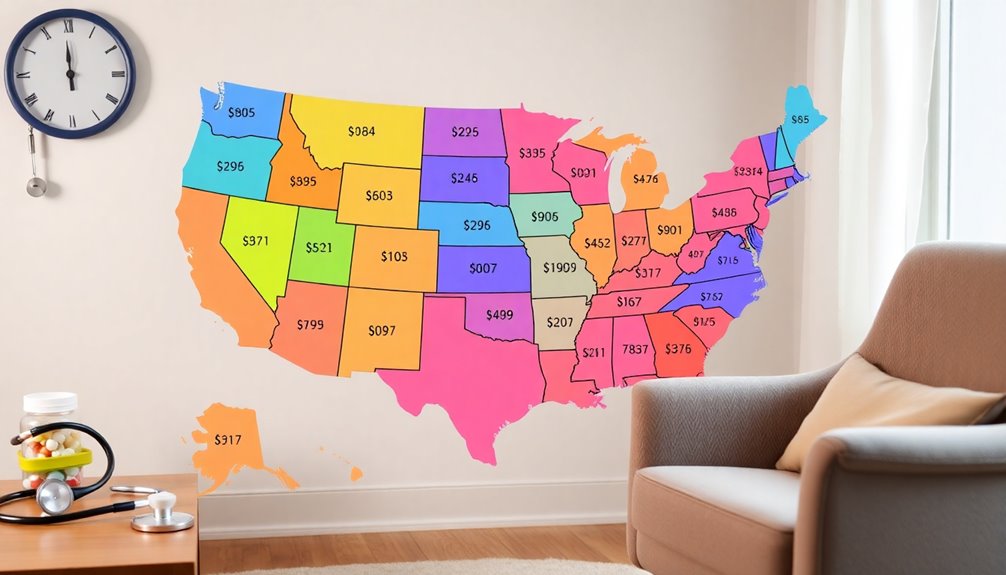Caregivers' pay varies widely based on location and experience. Generally, the average hourly rate for caregivers in the U.S. is about $21.12, but in Texas, it drops to $12.84. Caregivers in high-demand states like Washington can earn up to $25.22 per hour. Experience, specialized skills, and the type of care provided can all influence earnings. There's more to understand about benefits and opportunities in this field, so keep exploring to discover additional insights.
Key Takeaways
- The average annual salary for a home caregiver in Houston is approximately $28,120.
- Nationally, in-home caregivers earn an average hourly rate of $21.12.
- In Texas, caregivers earn an average of $12.84 per hour, significantly below the national average.
- Specialized skills and experience can lead to higher earnings, with top rates in states like Washington at $25.22/hour.
- Agency-employed caregivers typically start at higher rates, averaging $21.13/hour compared to private caregivers.
Overview of Caregiver Pay Rates

When you look at caregiver pay rates, you'll notice significant variations based on location and experience.
For instance, in Houston, the average salary for a home caregiver is around $28,120 per year, with hourly rates ranging from $8.40 to $17.66. Nationally, the average hourly rate for in-home caregivers is about $21.12, translating to a monthly salary of approximately $3,660.80.
In Texas, caregivers earn an average of $12.84 per hour, which is 21% below the national average. States like California pay as much as $24.00 per hour, while Alabama averages $16.17.
Understanding these differences in caregiver pay can help you navigate your career options and set realistic salary expectations.
Factors Influencing Caregiver Salaries

When considering caregiver salaries, several key factors come into play.
Your geographic location can greatly affect pay rates, along with your experience and the type of care you provide.
Understanding these influences helps you navigate the caregiver pay landscape more effectively.
Geographic Location Impact
Although caregiver pay can vary widely, geographic location plays an essential role in determining salaries. Your caregiver salary can range greatly based on where you live.
For instance, hourly rates fluctuate from as low as $8.40 to as high as $24.61 across different states and cities. In Texas, the average posted starting rate is around $12.84 per hour, which is remarkably 21% below the national average.
Conversely, areas like California and Washington offer some of the highest pay, with caregivers earning approximately $24.00 and $25.22 per hour, respectively. The cost of living in your area also impacts these rates, as higher living costs generally lead to higher compensation for caregivers.
Experience and Qualifications
Experience and qualifications greatly influence caregiver salaries, as those who've spent more time in the field generally command higher pay. Caregivers with specialized skills, such as assisting clients with dementia, can also see a notable boost in their pay rates. Here's a quick overview of how experience and qualifications affect caregiver salaries:
| Experience Level | Average Pay Rate | Specialized Skills Impact |
|---|---|---|
| Entry-Level | $16.17 | Basic Assistance |
| 1-3 Years | $18.50 | Moderate Skills |
| 4-7 Years | $21.00 | Advanced Skills |
| 8+ Years | $25.22 | High-Demand Skills |
Your experience and any specialized skills you possess can considerably enhance your earning potential in this rewarding field.
Type of Care Provided
The type of care you provide plays an essential role in determining your salary as a caregiver. For instance, personal assistance or companionship might yield lower average hourly rates compared to specialized medical care.
Experienced pros share that niche services, like dementia care or post-operative recovery assistance, often command higher pay due to the skills and training involved.
If you’re a live-in caregiver, you can expect a starting rate around $21. 13 per hour, which can increase with experience and specific client needs. Additionally, many caregivers may find opportunities for salary growth by acquiring specialized training or certifications tailored to specific patient needs. It’s also important to consider that the salary may vary depending on geographical location and the caregivertoresident ratios in facilities, which can impact the demand for caregivers. Overall, the role can be both rewarding and financially viable, especially for those who are dedicated to providing compassionate care.
Also, taking on additional responsibilities, such as meal preparation or medication management, can elevate your earnings.
Ultimately, the complexity and demands of the type of care provided greatly influence your potential salary.
Average Hourly Wage for Caregivers

When considering a career as a caregiver, it's important to know that average hourly wages can vary considerably based on location and type of care provided.
In-home caregivers in the U.S. typically start at around $21.13 per hour. However, if you're in Texas, the average hourly wage drops to $12.84, which is 21% below the national average.
In Houston, caregiver hourly pay ranges from $8.40 to $17.66, with the 25th percentile earning about $11.63.
Conversely, if you're in California, you could earn around $24.00 per hour, while Washington offers rates up to $25.22.
Consequently, your pay as a caregiver largely depends on where you work and the specific demands of your role.
Salary Variations by State

How much you earn as a caregiver can vary widely depending on your state. For instance, Alabama caregivers average $16.17 per hour, while those in California can make as much as $24.00.
The national average hourly rate for caregivers is about $21.12, leading to a monthly salary of around $3,660.80. In Florida, caregivers earn an average of $20.01 per hour, totaling roughly $3,468.40 monthly.
New York caregivers see an average of $21.77 per hour, translating to about $3,773.47 per month. Significantly, Washington offers the highest rates, with caregivers earning $25.22 per hour, resulting in roughly $4,371.47 each month.
Clearly, your location plays a significant role in determining your caregiver salary.
Comparing Agency vs. Private Caregiver Rates

What factors influence caregiver pay rates between agency-employed and private caregivers?
Typically, agency-employed caregivers earn higher average starting rates, averaging around $21.13 per hour, thanks to additional benefits like healthcare and training.
In contrast, private caregivers may set their rates based on specific needs, resulting in a broader pay range.
Local minimum wage laws also play a significant role in determining these agency vs. private caregiver rates, so you'll need to take into account your location.
Additionally, specialized skills can impact earnings; some private caregivers with niche expertise may even exceed the average agency rates.
Understanding these differences is vital as you navigate your senior caregiver career right and make informed decisions about your compensation.
Benefits and Compensation Beyond Hourly Wages

While hourly wages are an essential aspect of caregiver compensation, they don't tell the whole story. Many caregivers enjoy additional benefits that enhance their overall earnings. These perks can greatly impact your financial well-being. Here's a breakdown:
| Benefit | Description |
|---|---|
| Healthcare | Access to medical insurance |
| Paid Time Off | Time off with compensation |
| Training Opportunities | Skill development and certifications |
| Flexible Scheduling | Adjustments for work-life balance |
| Retirement Plans | Contributions to your future savings |
In Texas, caregivers average $12.84/hour, but those employed by agencies may receive benefits that raise their total compensation. Specialized training can also justify higher pay rates, offering you more earning potential.
Job Opportunities for Caregivers

With countless job opportunities available, caregivers in Texas can find a range of positions that suit their skills and preferences.
Many roles are listed on Care.com, offering flexibility in hours and pay. Here are some options you can explore:
- In-home caregivers providing personalized support
- Positions at 12 Oaks Senior Living and BSA Hospice
- Full-time roles at Juniper Communities in Dallas
- Specialized senior care services based on experience
- Opportunities in cities like Austin and Georgetown for higher pay
With pay ranging from $10.60 to $16.50 per hour, you can maximize your earning potential and make a meaningful impact in the lives of those you care for. Additionally, understanding budgeting techniques can help you manage your finances effectively as you navigate your caregiving career.
Take advantage of these opportunities today!
Insights Into Related Caregiving Professions

As you explore the diverse world of caregiving, it's important to recognize that various related professions offer unique opportunities and pay scales.
Senior caregivers, for instance, typically earn an average salary of $76,636 per year, reflecting the higher responsibilities they hold.
Weekend live-in caregivers can expect around $44,617 annually, catering to specific needs during those days.
Mobile caregivers earn about $28,917 per year, which shows the flexibility in their roles.
Non-medical caregivers average $34,599 annually, indicating their crucial contributions as well.
Significantly, positions at First Light Home Care average $59,064 per year, highlighting the potential for increased earnings in specialized caregiving roles.
Each of these positions plays an essential role in providing the help seniors need.
Frequently Asked Questions
How Much Do Most Caregivers Make per Hour?
You might be surprised to learn that caregivers in higher-paying regions can earn up to $27.89 an hour!
On average, caregivers make around $21.12 per hour nationally, but this rate can vary considerably based on location and experience.
In Texas, for instance, the average hourly wage is about $12.84.
What Is the Rate for a Caregiver in Texas?
In Texas, caregiver rates vary considerably, with averages around $12.84 per hour.
You might find hourly wages ranging from $9.32 to $17.69, depending on your experience and location.
If you're in higher-paying cities like Austin or Georgetown, you could earn more, with rates around $16.22 and $15.20, respectively.
Knowing these figures can help you gauge your potential earnings and make informed decisions about your career in caregiving.
How Much Do Family Members Get Paid for Caregiving?
If you're a family member providing caregiving services, you can earn compensation that often aligns with professional caregivers.
In Texas, you might expect around $12.84 per hour, though pay can vary based on your responsibilities, like meal prep and personal care.
Some states even have programs to help financially support family caregivers, ensuring you get fair compensation for the essential care you provide to your loved ones.
What Is the Difference Between a Caregiver and a Caretaker?
When you think about caregivers and caretakers, you'll notice they've distinct roles.
Caregivers provide personal care and assistance with daily activities for individuals in need, often requiring specialized training for medical tasks.
On the other hand, caretakers focus on maintaining a safe and clean environment, typically working more independently without direct personal interaction.
Understanding these differences can help you choose the right support based on specific needs and responsibilities.
Conclusion
To sum up, understanding caregiver pay can help you navigate this rewarding yet challenging field. Whether you're considering a career as a caregiver, exploring agency versus private rates, or seeking additional benefits, knowing what to expect empowers you. With varying salaries by state and opportunities in related professions, you can find your niche. So, as you weigh your options, remember: informed choices lead to fulfilling careers, rewarding experiences, and the chance to make a real difference in people's lives.









